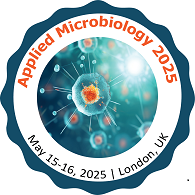Call for Abstract
Scientific Program
6th International Conference on Applied Microbiology, will be organized around the theme “Innovations in Microbial Research: Bridging Science and Application for a Sustainable Future”
Applied Microbiology 2025 is comprised of keynote and speakers sessions on latest cutting edge research designed to offer comprehensive global discussions that address current issues in Applied Microbiology 2025
Submit your abstract to any of the mentioned tracks.
Register now for the conference by choosing an appropriate package suitable to you.
Nucleic acids, such as DNA and RNA, are complex organic compounds found in living cells. These large molecules consist of long chains of nucleotides linked together. Each nucleotide contains a phosphate group, a sugar, and a nitrogenous base, which can be a purine or pyrimidine. When broken down, nucleic acids yield phosphoric acid, sugars, and a mix of organic bases. Their intricate structure plays a crucial role in storing and transferring genetic information, making them fundamental to cellular function and the continuity of life.
Presents cutting-edge research across diverse areas of microbiology, emphasizing microbial biotechnology, health interactions, and agricultural applications. This comprehensive resource explores critical topics such as microbial enzymes, nanoparticles, bacterial polyhydroxyalkanoates, and the role of biosurfactants in bioprocessing. It also delves into pressing issues like multidrug-resistant bacteria, probiotics, and the therapeutic potential of fungal chondroitin’s. Tailored for masters, doctoral, and postdoctoral researchers, as well as graduate-level courses, this book is an invaluable asset for scientists engaged in interdisciplinary studies within life sciences.
Clinical microbiology is a branch of science focused on the interactions between microorganisms and microorganisms in both healthy and pathological states, emphasizing their roles in disease processes and treatment outcomes until clinical recovery is achieved. The Clinical Microbiology curriculum is crafted to equip trainees with comprehensive training in medical microbiology, virology, infection prevention, and infectious diseases, while also ensuring they acquire essential core competencies vital for effective medical practice.
Microbial biotechnology represents a groundbreaking intersection of science and application, utilizing microbial agents to tackle critical challenges in agriculture and industry. By employing genomic insights, this field pioneers innovative strategies for pest management, including the development of safer biological controls and the engineering of pathogens to lower their virulence. It also fosters the creation of novel industrial catalysts and fermentation processes, while advancing bioremediation techniques to cleanse contaminated soils and waters. This multifaceted discipline is essential not only for enhancing biotechnological applications but also for enriching human nutrition and fortifying the health of plants and animals, laying the groundwork for sustainable agricultural practices.
Medical microbiology is a vital discipline that investigates the intricate relationship between microorganisms and human health. This field focuses on the prevention, diagnosis, and treatment of infectious diseases caused by diverse pathogens, such as bacteria, fungi, parasites, viruses, and prions. Beyond merely combating infections, medical microbiology delves into the therapeutic potential of microbes, exploring their use in innovative clinical applications that can enhance health outcomes and improve patient care.
Biotechnology represents a dynamic fusion of traditional practices and cutting-edge techniques designed to optimize biological systems for human advancement. From the ancient domestication of animals and selective breeding of plants to modern innovations such as genetic engineering and cell culture, biotechnology harnesses nature's potential in new ways. This evolving field not only enhances food security and medical therapies but also opens doors to sustainable solutions for environmental challenges.
Pharmaceutical microbiology is a specialized field that merges microbiology with pharmaceutical sciences to enhance drug development and production. It investigates the role of microorganisms in creating anti-infective agents and ensures the integrity of pharmaceutical environments by controlling microbial contamination. This discipline also focuses on the removal of harmful microbial byproducts, such as exotoxins and endotoxins, safeguarding the safety and effectiveness of medicines. By harnessing beneficial microbes and mitigating risks, pharmaceutical microbiology plays a critical role in advancing healthcare and pharmaceutical innovation.
Food microbiology examines the bacteria that inhabit, transform, or contaminate food. It studies spoilage microbes, foodborne pathogens, and beneficial organisms used in fermentation for products like cheese, yogurt, and beer, as well as probiotics that support gut health, highlighting the vital role of microbes in food safety and quality.
Environmental microbiology studies how microorganisms interact with their environments, including the spread of viruses, bacteria, algae, fungi, and parasites. It explores their roles within ecosystems—spanning the atmosphere, hydrosphere, and litho-ecosphere—and examines how these microbes influence and is influenced by their surroundings, which is essential for understanding ecosystem health and environmental changes.
A branch of biotechnology known as microbial biotechnology leverages microbial sciences to produce industrial commodities at scale, utilizing microbial cell factories. By manipulating microorganisms through various methods, such as exposing them to mutagens to induce mutations or employing gene amplification techniques, scientists can enhance product yields significantly. These strategies enable the efficient production of a wide range of valuable substances, from pharmaceuticals to biofuels, driving innovation in sustainable industrial practices.
Microbiology is the study of microscopic organisms, including bacteria, archaea, viruses, fungi, prions, protozoa, and algae, collectively known as microbes. This field is divided into two main branches: pure microbiology, which focuses on the theoretical aspects of these organisms, and applied microbiology, where microbes are utilized in practical applications like fermentation and biotechnology. Additionally, microbiology can be classified by taxonomy into specific areas such as bacteriology, mycology, protozoology, and phycology, often overlapping with other scientific disciplines.

